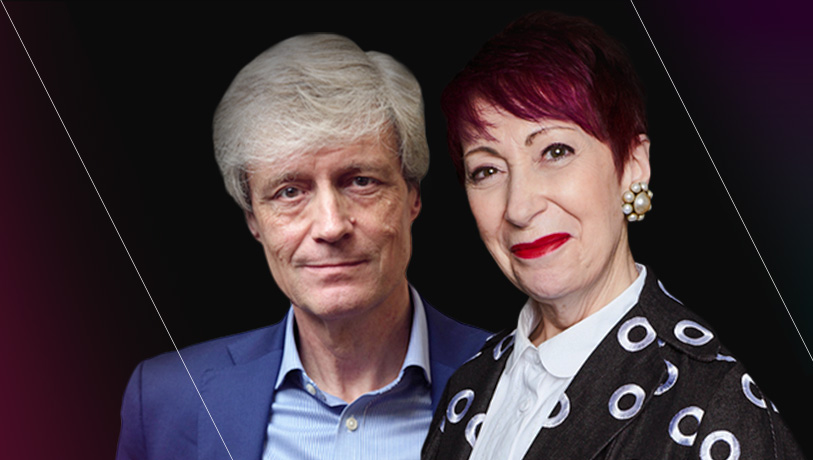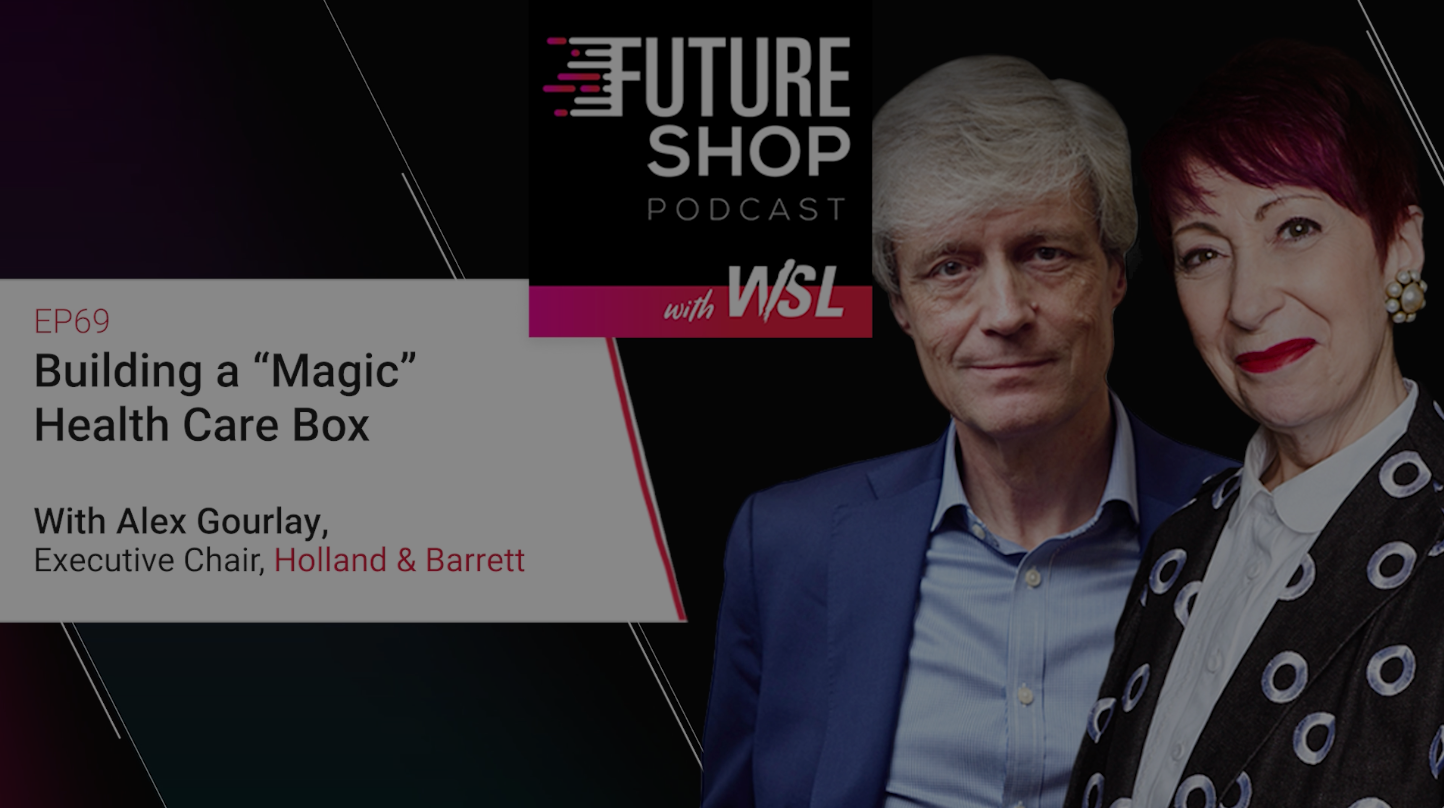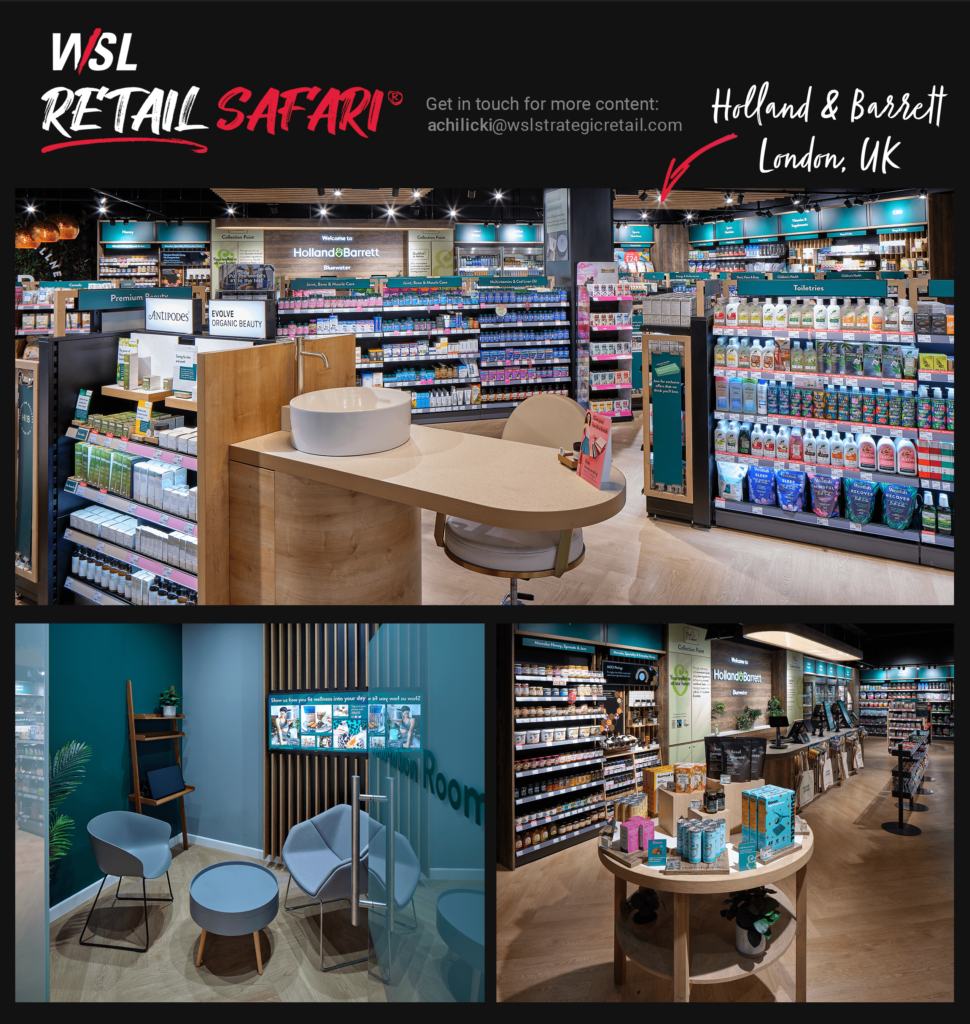In this episode:
Wendy Liebmann talks to Alex Gourlay, Executive Chair of Holland & Barrett, the UK’s leading wellness retailer, and formerly Executive Vice President and Co-Chief Operating Officer of Walgreens Boots Alliance, and President of Walgreens about the future of health care retailing.
They discuss:
- The generational opportunities in health care (from food to pharmacy)
- How younger people are much more proactive in taking care of their health, and how longevity means opportunity to support older people with solutions for a continued healthy life
- The power of the pharmacist and the importance of maintaining personal relationships with customers
- How technology creates great opportunity for personalization with shared data to deliver specific one-to-one solutions
- The power of physical retail that is simplified, edited, and organized by solutions
- Early “green shoots” of integrated health care, but with much more opportunity still to come to build “a magic box”
Don’t miss upcoming episodes, subscribe to our podcast with your favorite app.
Watch the video episode:
Wendy 00:09 Hello, I'm Wendy Liebmann, CEO and Chief Shopper at WSL Strategic Retail and this is Future Shop. This is where I talk to innovators disruptors and iconoclast about the future of retail. Today, my guest is Alex Gourlay, Alex is the Executive Chair of Holland & Barrett, the UK’s leading wellness retailer and one of the largest in Europe. He'll tell you more about the company when I let him get a chance to speak. He was formerly Executive Vice President and Co-Chief Operating Officer of Walgreens Boots Alliance, and President of Walgreens many of you will remember him in that role. He was also before that when I first got to meet him, CEO of Boots, the iconic UK and Ireland based retailer and as important with all that he is also a pharmacist. So welcome, Alex and happy new year. Alex G. 01:10 Thanks, Wendy. Happy New Year to you and to all of the viewers as well, Wendy 01:13 thank you. It's great to have you here. And actually quite a luxury since I only saw you a couple of weeks ago in New York when we were all here to honor 90 years of community pharmacy and NACDS. And it was a great gathering. So I feel quite lucky that we've had a chance to celebrate and have coffee and all of the above. And here we are again. So thanks for joining me, you know, you have an incredibly unique and valuable perspective on retail health care, or based on your experience all around the world, really, but certainly with two now three iconic retail health care companies. I was really struck by that because as we look at where healthcare is going around the world, and especially in the US, I thought your view would be so valuable here. The other thing that struck me is you and I have had a continuing conversation over the years about this notion of retail as a “magic box” based on some work that we did a number of years ago, some research we did about building my magic box. And so those two things came together in my mind as I really thought about where retail healthcare is going and what a magic box of retail healthcare might actually look like. So anyway, after that long intro, welcome again, you know, I thought it'd be really helpful. There are people on this, who will be viewing and listening who actually don't know, Holland & Barrett. So can you just take a minute and tell us a bit more about the company and why it's so unique in this world. Alex G. 02:48 Surely, in the end, a whole number is 154 years old. So again, a very historic company, companies and brands like Holland & Barrett but don't survive for all that time without having something really important to the core. And what has been at the core of Holland & Barrett through all of that time is healthy food. And final, just a bit of a interesting fact. There was Holland & Barrett and there was a Mr. Ryder, and Mr. Ryder who was a third partner of the company back in 1920, almost halfway through its existence is the same Mr. Ryder who created the Ryder Cup, because he believed that healthy foods, seeds and fruits and raisins, gave better performance in sport, and particularly his sport, which was golf. The core of our company Holland & Barrett is health, wellness, and food, and it's been the same all the way through. And of course, you can take different forms, you know, that vitamins and supplements and minerals and say for itself, but that really is the core of Holland & Barrett. In the UK 720 locations. So every High Street in the UK more or less. We have about 80 locations now in Ireland. And we have a couple of 100 locations actually in Holland and Belgium so that is the core of the business but we also create an about 13 other countries through either franchising or through wholesaling, including China, including India, and including many Middle East countries as well. I will say International, not global. Two thirds of our business is based in the UK, the core part of the business, that’s the shape of it and that's the history, a bit of history of the Wendy 04:25 thing that's always intrigued me about the company over the years, as I've observed it in my travels was this connection this broader connection to, as Colleen Lindholz from Kroger would call it, food as medicine and that very strong focus around as you said not just vitamins and minerals but grains, all the things that can provide a more holistic view to health care and it felt very contemporary then I didn't know the Ryder Cup story, but very contemporary then. I certainly feels very contemporary now. So you know, from your perspective, when you think back to young pharmacist Boots and then traveled and worked around the world, what surprised you most about the changes in retail health care, since your days in Boots, both, you know, in the UK and the US and other parts of the world, Alex G. 05:21 I would say the thing that surprised me the most is the lack of change in the consumers’ mind about the importance of health care, and the importance of trust and relationship in health care. So as a young pharmacist, the thing that I enjoyed even more than the commercial aspects, which I also find fun as well, was that relationship with the local community who came to that pharmacy for advice on many different things, not just medication, but in many aspects of their wellness. And the more that you build a relationship, a personal relationship, either as a pharmacist or as an assistant to the pharmacist or as a healthcare assistant, the more they feel welcome. And the more they come back, and the more they take the advice. And while, the world, the products available and what works and what doesn't work and technology, of course, and data really has changed a lot in many aspects of how people see healthcare, the one thing that hasn't changed is that local relationship, that community based relationship, you Wendy 06:22 know, that's so powerful in the way you describe that, because sometimes, I think we forget, and particularly in this country, and I won't get into medical reimbursement and prescription reimbursement and all of those issues, although we could, no doubt, because you've lived through that on this side of the world too, that value of that personal interaction. And then as drugstores and other retailers with pharmacies have really looked at issues around profitability and speed of delivery, in terms of recommendation and how many prescriptions they're filling, and all of that, you know, we talk a lot about the value of the pharmacist here and yet the pharmacist seems to be just so buried in other things. So you reminded me of, and I'm sure many others of why that relationship is is so important. And that hasn't changed or shouldn't change, if we want to understand health care. The other thing I thought was interesting that you just said is people haven't changed in their needs. And I certainly would agree with that. One thing we're seeing here is how people there is an increasing concern about trust in health care delivery, or accessibility and trust. And so people are wanting to take greater control of their own health and wellness, we see that in all our own research. And I wonder how you're seeing that when you think about Holland & Barrett and how you're enabling people to be more proactive about their health. Alex G. 07:56 I think these are trends that we see for sure, in Holland & Barrett and we see in the UK and in Europe, as well as I saw in America, because I worked through the pandemic in America, with Walgreens. And of course, the pandemic is exaggerated and accelerated these trends. And I think there's a couple of very simple reasons for it. I think, first of all, the fragility of human life, we are on this planet for a limited period of time. And everyone saw that close up into the pandemic, it was nobody think back to these very dark days, in my view, when the scary, scary virus was around the place, there was real challenges. There's real human loss. And I think everyone observed that in different ways, either very close, or if they were forced enough, maybe at a distance. And therefore, I think psychologically, people decided that they want to take even more control of their precious lives, and wanted to understand more about the data, and the personalization about data that supports their lives. I knew you see it in so many different ways. But the way that I think we see the most today is in the younger generations if I can say that. You know, where I was quite funny. And I totally you know, when you think of how, when I went to university, I used to live my life it was that of alcohol then smoker going by the smoke, a bit of alcohol and some pretty fast food, and some relatively heavy living. For me anyway, probably quite lightweight for many others, but for me quite heavy living, compared to today where a lot of university students are know counting the steps they’re now counting the protein that was in the body, they now staying fit or not touching alcohol, and are certainly very, very unfavorable in the main to processed foods. It's really quite a shift in behavior of a generation that's going to be earning and generate the most value in wealth in the next 20, 30, 40 years just seem to be much more aware of taking much better care of themselves at a very personal level. That's probably the biggest shift that's coming, I think, for all of us in the future. And how Wendy 09:58 do you see that reflected when you, you know, walk into your stores, and in a lot of the technology that you're beginning to build in terms of personalization, how are you thinking about that, as you build and support that younger generation. Alex G. 10:16 So again, you come back to the maybe a couple of themes, the first theme we've touched on already, which is, people still want to have a level of human interaction with an expert, or someone with knowledge, because it gives them the reassurance that they're getting the best solution. The second part is, they're much more aware, we no longer rely on the general practitioner, the doctor or the specialist. They rely very much on, you know, the search engines, the Googles of this world, and etc. And all of the experts all the influencers online. So you put these two things together, and you get in or the combination of these two things. And I think that's where the majority of that younger generation are at, you know, they'll do their work. They'll come in is really quite knowledgeable, sometimes very knowledgeable. And our job in our new magic box, is to make sure that we can add value to their knowledge, and really help them to make even better choices or confirm the choice they’re making and is the best for them. Wendy 11:14 It's interesting, because I know now ow America Shops® research that you're familiar with, the number of places we see people going to do their homework for information around health and wellness is just extraordinary. When we think about how people are busy, short of time, you know, all of these things, it is extraordinary to see the number of places they go, and the time they spend to your point doing due diligence. Yes, especially younger, because they are so tech savvy, and enabled. But also, as you said, during the pandemic where people had to do more virtual consultations and even you know, older generations now who have become more facile with using technology, that they are so much more informed. So that's an interesting relationship. How do you add value in a retail space, not just assume you're they're the only expert in the room? Alex G. 12:10 Yeah, because back to a thing that the way you add value is by having data and technology that is able to really say add value to the conversation so that you know, you, excuse us for an English phrase or a British phrase, “know your onions”, you got to know you got to know your stuff. As soon as someone demonstrates a lack of understanding or lack of care or lack of knowledge, then the customer is switched off, the relationship is broken very quickly. Wendy 12:37 I mean, there's so much I'm sitting here with my Apple watch on the technology, the wearables, the ability to engage and personalize, at least my stand up, sit down, walk around, do all those sorts of things. How do you see some of these new wearable technologies, informing not only health care, but also how you go to do business in a physical retail space in the future. So Alex G. 13:05 I think the core to this is, if people trust you, they'll give you more information. So whether it be lifestyle information, or whether it be DNA information, which you know, you can post pandemic, everyone's DNA is locked away somewhere. Because of all had a PCR test, or a blood test. So I think you take all of the information. And with a trusted environment, you create, you know, personal solutions with the best in breed solutions. And as the opportunity I think, inside the magic box, you have the relationship, the person gives you their data in an appropriate form. And then using technology, you're able to really through personal navigation that may be digital navigation and personal navigation, you're able to direct people to exactly the one two or three things that they can do to really improve the core to their life. The idea of longevity, I think has moved on, it really is about adding quality years to live. So living a fuller life, both physically and mentally for longer. I think that's a big deal going forward. Yeah, I Wendy 14:10 remark on that. So often reading the paper digitally or physically and reading the obits, excuse the expression, you get to a certain age, and you want to see who's hanging around or not. And I'm amazed at the people who are 90, 100, whatever, or the people who, in their 60s and 70s, are engaged in new lifestyles, life activities, all of that. And so that issue and opportunity around longevity is something that I think we talk a lot about younger consumers, younger patients, whatever, but also, how do we help people in their 60s 70s 80s continue to live as you said, a productive and healthy life? That seems like such a massive, wonderful opportunity at both ends of the scale or at all ends of the scale. How do you think about that? in a retail environment, it's something you know with a Holland & Barrett or Boots or Walgreens, whatever, even a grocery store, and in whomever. When we think about that, is there a one size fits all environment for that and data helps personalize the conversation? How do you think about all of that? Alex G. 15:18 I think that's true, I think that is a one size fits all. But the model’s probably a combination off and online, because you need authority as well. You need a range of solutions, because as you said before, the things that influence the due diligence that you talked about, is is varied. So people come in informed with very specific areas of interest, and maybe specific brands or specific solutions. So you got to be able to have real authority and products and solutions, including the best of breeds. So whether it be sleep, or whether it be energy or whether it be anywhere, diet, food as medicine, all immunity, all these areas are there. So I think inside the magic box, you've got to be able to provide both their clarity to the right solution through the mystifying the data they bring and information they have to the solution that's personalized to them, along with authority, you know, it's almost that authority piece as well. So it's a very specialized model, in reality, and I think to do this well, I think a generalsits can make a good job of it. But I think people are looking beyond the generalists in my view, to more specialist models. That's the Wendy 16:29 thing that's really interesting to me, particularly as I look at the US now. And I think about here we are we always, every so often, we go through this thing of too many stores, right? Too many department stores, too many drugstores, too many whatever, and especially as digital and ecommerce and it's more specific shopping form has grown so much. And I do wonder about that because I think about the drug store as a channel as being both healthcare at the back. If you get to the pharmacy, the OTC is whatever but convenience at the front. And I'm at this point where much to the conversation or the point you just raised about, does it really now have to hone its message the drug store down in the US to be a specialty place for health and wellness and not a place where you forget the dog food and you run in at the last minute? What's your perspective on that you have a unique view to all of that? Alex G. 17:26 I mean, I don't think it's a surprise if I said it's not working the way it is today. You know, I think that's very evident from what we know, it will fit for this dropping rapidly at a time when post pandemic can post their level of interest we spoken about in wellness, you know there that you would think that the interest will be increasing. I do really strongly believe the strategies that CVS and Walgreens are pursuing to become the local health care and wellness providers are the right strategies. But it takes time, it takes time in different ways to get to that position. Wendy 18:00 Yeah, it's a hard ask right. When you think about it, you know, when so much of the when we think about the front store issues as well as the pharmacy issues. One of the greatest frustrations we hear from consumers when they shop in, particularly in drug stores, but in general is that they really do see what you said about the trust of the pharmacist. But the pharmacist is so busy doing other things that they never get to talk to them. And of course, vaccinations added to that list of chores. So it's not that they don't value the pharmacist, it's that they don't get to see the pharmacist. I've always thought you and I probably had this conversation that if somebody moved the pharmacy right to the front of the store, it would be a really good thing. And that to me will be the sign of change in the US. But yeah, there are a lot of other issues. You've often talked about “green shoots”, I love the optimism of that even though things are slow. Are you seeing green shoots in this particularly in the US? I think it's a little different in Europe, but green shoots of this emerging in the US when you think about healthcare and pharmacy and all the related areas of delivery. Alex G. 19:10 Yes I do. I think that if you think who's gonna solve the need for the customer, this this need for more personalized information that keeps them healthier for longer,wellness, whatever, we want to describe it. If you take the wellness side of the coin, rather than illness side of the coin, the government is not going to do it. Because they're too busy dealing with the problem of illness. Charities can't do it because again, they're picking up the pieces where the government other gaps where people fall through unfortunately, like every society, and the US is certainly no no different. So it's got to be done by a commercial company. So commercial company like integrated insurer retail like CVS or UnitedHealth and Optum or Walgreens with VillageMD. These more integrated models are the places where the commercial businesses can provide that customer because of the huge customer need. There's a huge economic needs. Again, if you look at the US, I'm gonna get this number slightly wrong because I'm probably a better a date, but 20% of the GDP roughly is spent on illness. There's very little spent on wellness, what an opportunity and people are very willing to spend their dollar, as you said, they search everywhere. If someone can just put all together for them in in a way that really is relationship based and personalized. I see green shoots, I think it's very hard, because change is enormously difficult, particularly when you find a successful model but you know, CVS is three, four or five years into their model with Aetna and Caremark longer, and Walgreens is a couple of years into its work with VillageMD and its healthcare strategy are all coming through. Amazon, you know, again, another great example of integration. So I think the green shoots are there. They're all there. Yeah. Wendy 21:00 Yeah, the other thing that's intriguing to me, and you see it a lot in New York City, which, of course is not necessarily typical, but you'll also increasingly see it around the country is these storefront specialty formats, whether it's Forward, which is you know, a subscription service to take care of your health, your family's health, you sign up for a monthly fee, and it gives you access as you probably know to doctors and medical care. There's a service called DNTL, which is another D N T L or some weird spelling, that again, oral care services, street front, easily accessible. I mean, everything from acupuncture, it's really amazing to see these individual street, fertility clinics, all of that and then specialized. There's a retailer here called Tia, which is women's health care, a broad range of services from OBGYN, herMD. So these sort of specialty formats that are building out with both service and to some degree product, but technology very personalized. And that, to me, is quite exciting to see that. It certainly talks to the need, as you said, and especially around younger consumers as well, and people who are caregivers, which is again, the other huge opportunity. Are you seeing a lot of those kind of specialty formats in the UK or Ireland or Europe, as you are in China, as you look around the world? Alex G. 22:28 Yes, but not to the same extent as the US, I would say. I think the incentives are slightly different in the sort of the government driven models in Europe compared to the sort of half and half model I would guess. That. you get in there, you know, where there's real incentives, I think, in the commercial models to to lower costs, and keep people out of secondary care. So yes, yes, and yes, but what I don't sense you yet in America, either, is someone meeting that customer needs in a really coherent way. It is interesting. I was reading an article the other day about the development of marketplaces, digital marketplaces, and you know, how they've developed in holidays or in clothing or in many sectors in reality, to the extent they are, they are now a major part of the go-to market models. But it's not yet happening in healthcare, this idea of a healthcare marketplace, digital and physical. And I think, again, it's an open opportunity to take these very narrow, but very important subjects like oral health or sleep or healthy eating and create really this this authority in wellness Wendy 23:38 just reminded me, one of the best health retailers, holistic ones that I have seen recently is actually Petco, the pet store, and they have opened a new little flagship, not so little, in Greenwich Village, here on Union Square. And it's just everything that you could possibly want, from the door. When you look at the window. They're grooming the dogs, to specialty food to a vet to toys, and every animal you could imagine everybody works there has to have a pet. So to your point about trust and engagement, and I marvel at it, I think why can we not have this marketplace, if you will, or physical representation for me? Why does it have to be just for my pet? I looked at it the other day, and actually on the front of the store, it says “Petco, a health and wellness store”, I think, and I'm like, okay, all right, I could do that. Anyway. So as we riff on the magic box of health in the future, you've raised a number of issues and opportunities there. I mean, are there one or two things when you walk into Holland & Barrett, and we'll share some images because I think, you know, again, a picture tells 1000 words or something, or it's better than 1000 words. When you walk into Holland & Barrett today, as you think about it, what do you see is the big trends for the future in that operation, where's the opportunity that you see for the future Alex G. 25:06 I’ll go back to where I started which I know is a bit boring even is about the quality of people and who they are and what they represent and what they know, enabled by great technology, which is powered, of course, by access to data that's in the right shape and the right form, to help them whether it be about the product or whether it be about the person that you're trying to care for. I think secondly, it really is about showing authority and expertise in the subject matters which are core to wellness. In our case, we talk about conditions, you know, we speak about immunity, or we speak about joint bones and muscles. Right now you know, we're speaking about gut health. And we'll speak about women's health. And we'll speak about men's health. So really conditions and benefits lead not ingredient, so much, not even category lead, but much more about the condition or the benefit from the solution that you're looking for. I think that's also linked into this idea of authority. When we speak to the buyer customers, UK customers effectively about consideration for holding, but it jumps when we speak about conditions compared to when we speak about categories. It's very obvious in the data, but we have to do it that way. I think also, there has to be a simplicity to the store. Because if you're already coming in confused from all of the inputs you've had online about what's best for you what works for you, there's got to be a clarity, even in a small store Ours as you know our average stores 1000 or 1500 square feet is the small stores, which gives a lot of flexibility in terms of costs, of course, which allows you to get more into the people more into the product, and more into the supply chain, there's got to be a cut through you can't have rows upon rows upon rows of bottles of potions and lotions and cures. There's got to be a clarity to it, which we're not there yet with but we got to get clarity. I think I think last but not least, there's got to be a recognition, I think that health care is for all wellness is for all so rich and poor, young and old. Whatever your gender is, whatever your background is, when you go in there, we've got to recognize you, who you are, what you represent what's important to you. So there's a localization of course, within that context of what's there. There's also a stylstic approach that is comfortable and warm. On an all wellness side of healthcare, not the on the side. Wendy 27:28 That sounds like a magic box to me, I'm already wanting to be there. So I love that vision. It is interesting to imagine how 15,000 square foot or 10,000 square foot drugstores in the US refine themselves to that. But that seems very true to what shoppers and consumers, caregivers, patients are looking for, just people are looking forward to your point about taking greater control and this post pandemic time. So thank you for sharing your vision of a healthcare magic box. I knew it would be hugely valuable to our audience. And as always great to see you. And hopefully I'll get to see you there sooner than later, which would be excellent. So thank you for that Alex G. 28:14 always welcome. We did if anyone wants to visit a Holland & Barrett, obviously we're very happy to show them, they’re welcome. We're a work in progress. But hey, we've been working progress for 154 years. That's the great thing about retail and customer focus you’re always work in progress. Yeah, Wendy 28:29 that's right. That's right. But the essence of it is the same. So really appreciate that. Thank you, Alex, a happy, healthy and everything for 2024. And I look forward to seeing you in the future soon. Alex G. 28:41 Thank you Wendy and to all the listeners. Thank you. Thank you. Wendy 28:44 You know, what Alex said is really everything's changed and nothing's changed. The essence of the relationship with the pharmacist that massive challenge that we seem to face in the US, but the ability to develop solutions for shoppers, patients, caregivers in ways that make this place this healthcare magic box usable, relatable, addressing issues that they are concerned about, and having the professional advice both through personalization and technology but laying on of hands, the people in the stores, the physical stores, who can help deliver on those solutions. He talked about not more and more stuff. And we hear a lot from retailers about simplifying to amplify. But it is a very holistic story of how we deliver health care in this next few years in a way that's really meaningful to shoppers, and that we don't lose this extraordinary opportunity with a proactive younger generation who are looking for solutions and advocating for themselves and older consumers shoppers who are really focused on have been their best life providing we can make it affordable, accessible to them. So huge amount of opportunity here and around the world, but especially here to get it right soon. So we look forward to continuing to follow that journey in the future. See you then. Cheers for now.




















